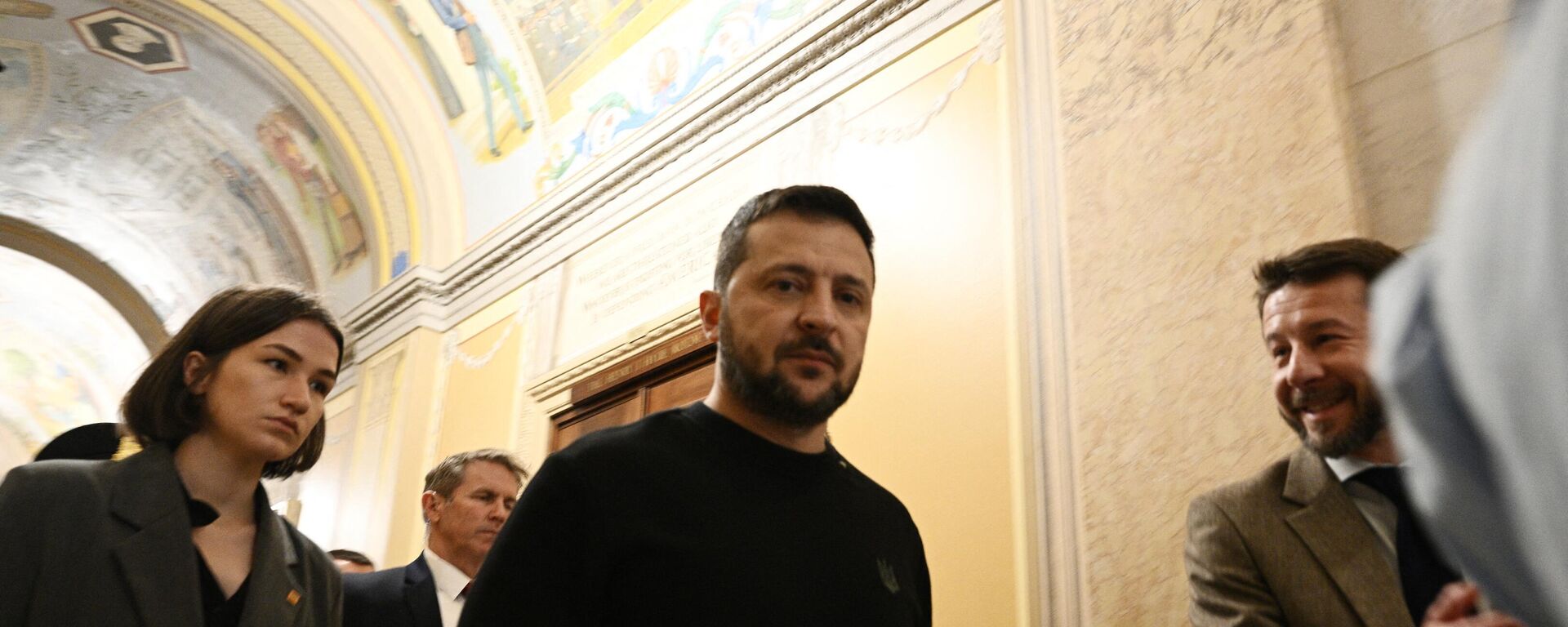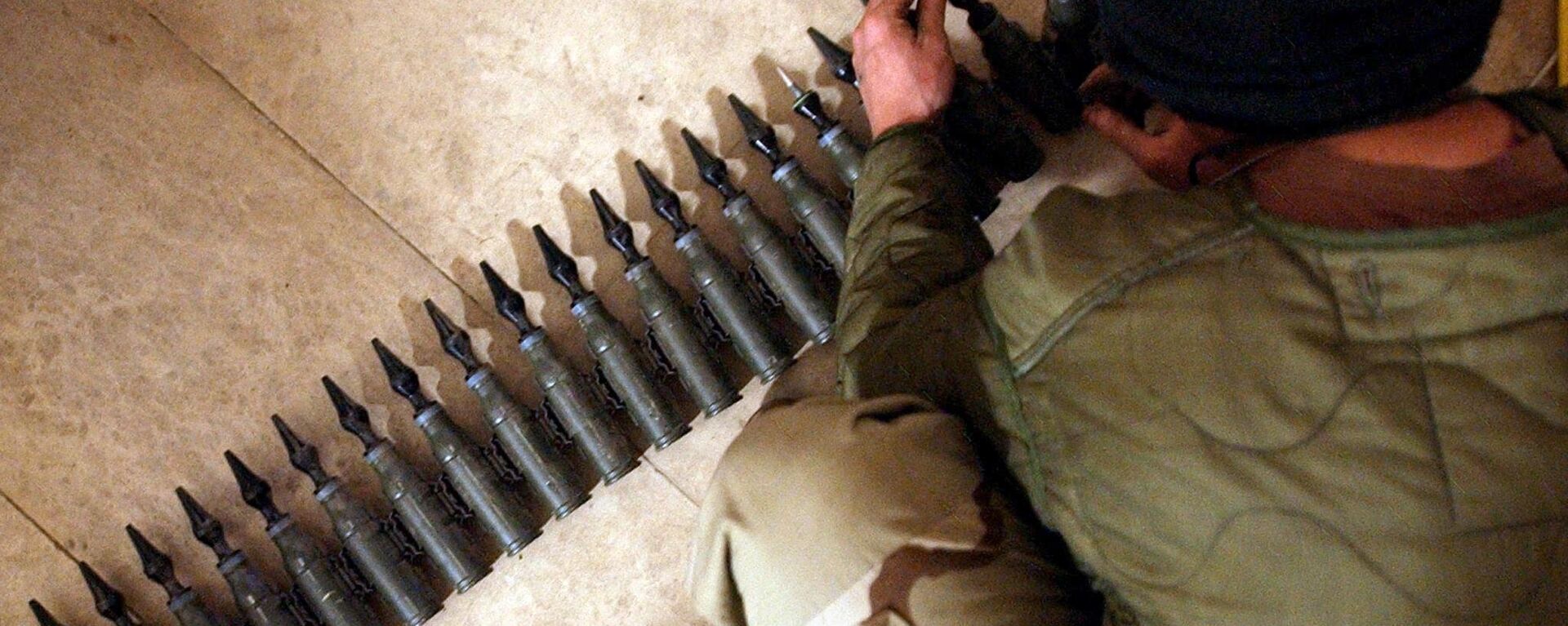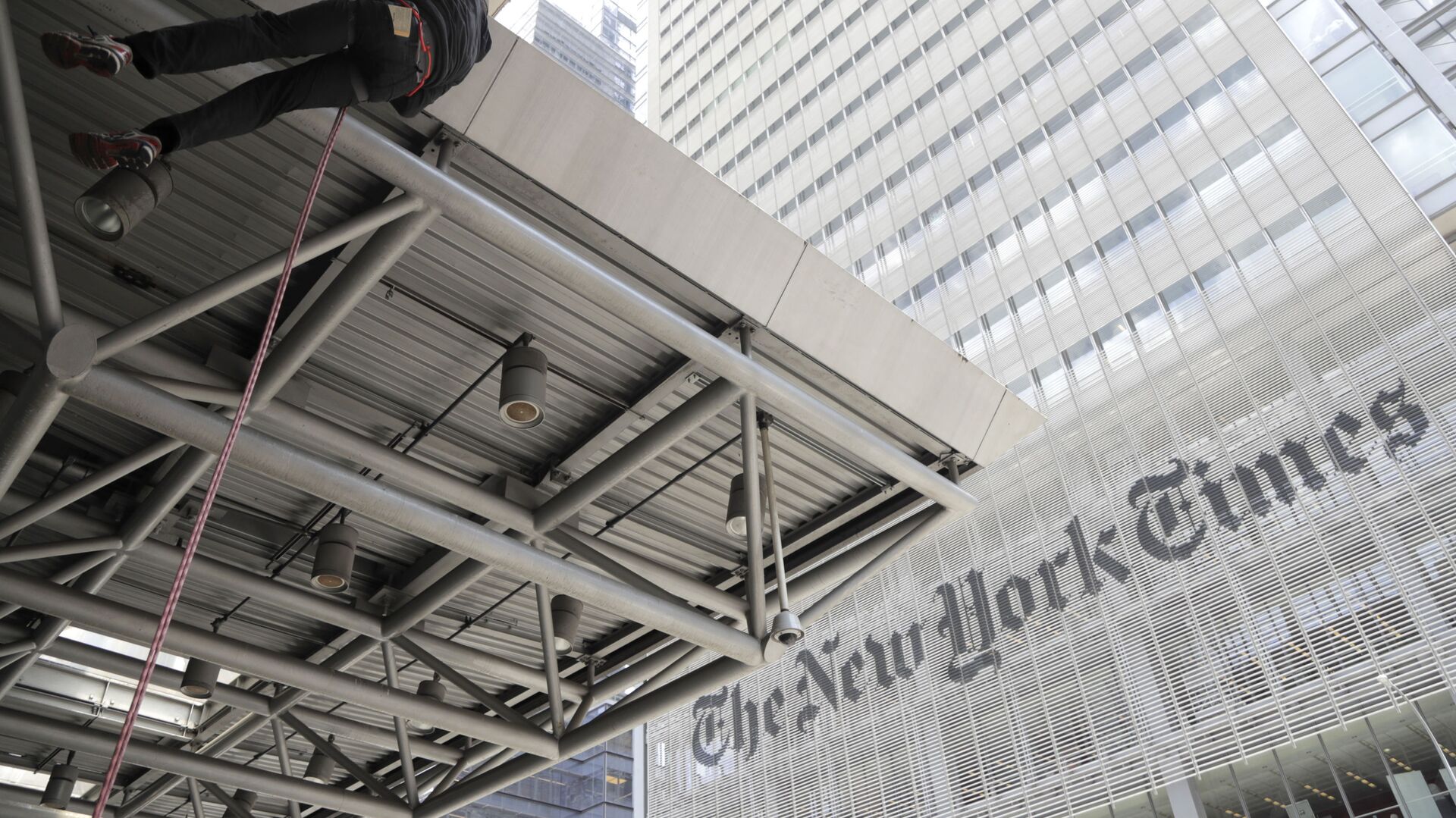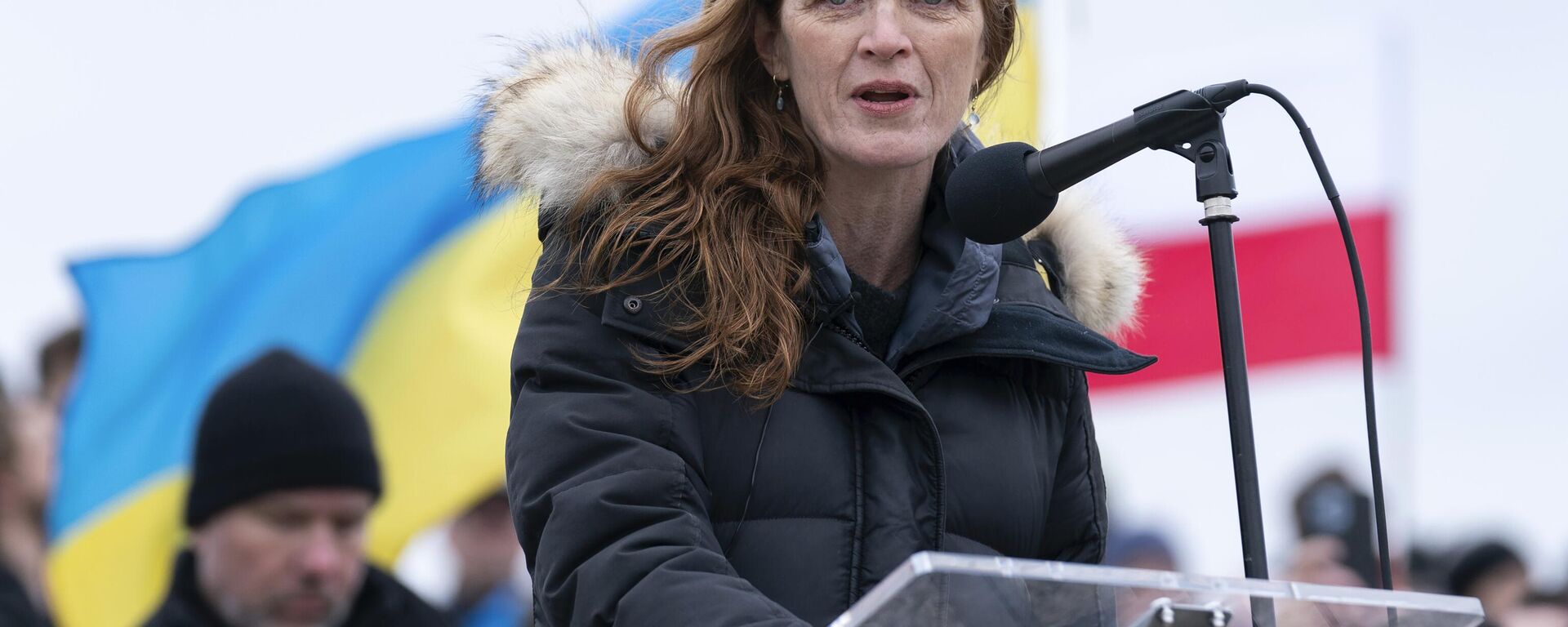https://sputnikglobe.com/20231228/cause-du-jour-to-yesterdays-news-western-medias-evolving-2023-coverage-on-ukraine-1115862086.html
Cause du Jour to Yesterday's News: Western Media’s 2023 Coverage of Ukraine
Cause du Jour to Yesterday's News: Western Media’s 2023 Coverage of Ukraine
Sputnik International
Media reporting on the conflict in Ukraine is a case study of mainstream journalism’s propaganda function on behalf of Western militarism.
2023-12-28T23:37+0000
2023-12-28T23:37+0000
2024-02-24T23:01+0000
americas
2023 year in review
volodymyr zelensky
americans
vladimir putin
ukraine
russia
washington
the new york times
nato
https://cdn1.img.sputnikglobe.com/img/107828/15/1078281553_0:321:3071:2048_1920x0_80_0_0_df5f6d95695aff42da8b24d664ca3c46.jpg
Earlier this year, American commentator Bill Kristol observed with distress the growing opposition among Republicans to US funding for Ukraine.An arch neoconservative, Kristol had been central in rallying support for America’s post-9/11 wars. Once democracy had been secured for grateful Iraqis, Kristol hoped to go further, toppling the Islamic Republic in Iran and cementing Western control over a notoriously independent region of the world.Famously, things didn’t work out that way. By 2023, the party of George W. Bush and Dick Cheney had grown increasingly weary of war and skeptical of US military involvement. Not only had Iran’s power grown in the Middle East, but now US hegemony over Europe seemed in doubt as well amid Russia’s special operation in Ukraine.Alarmed by the development, Kristol set up a pressure group to ensure the GOP remained committed to funding for Kiev. The organization’s first television ad urged Republicans to keep the money flowing while sounding all the usual jingoistic notes:When America arms Ukraine we get a lot for a little. Putin is an enemy of America… The more Ukraine weakens Russia, the more it also weakens Russia’s closest ally, China. America needs to stand strong against our enemies. That’s why Republicans in Congress must continue to support Ukraine.The advertising blitz signaled the panic felt by much of Washington’s pro-war establishment as almost half of Americans polled now said the country was sending too much money for Ukrainian President Volodymyr Zelensky’s quixotic endeavor.But how did the United States arrive at this juncture, with a previously hawkish American public now increasingly opposed even to funding a proxy conflict? The answer in part lies in a discredited mainstream media’s growing inability to manufacture consent for another “forever war.”Past is PrologueAnti-Russian sentiment has deep roots in the West. Tensions have grown in the past several years amidst the “Russiagate” narrative, which sought to distract from the declining popularity of America’s political establishment and discredit former President Donald Trump with claims Russia interfered in the 2016 US election. The accusation played a useful role in asserting US soft power as part of a broader “pivot to Asia” foreign policy dating back to the Obama administration.Russiagate itself was built on a decades-long foundation of McCarthyism that came to the fore after the United States and the Soviet Union emerged from World War II as dueling superpowers. Anticommunism was the cornerstone of US foreign policy for four decades, with hostility towards Russia at its core.Thus, when Russian President Vladimir Putin announced the country’s special military operation in Ukraine in early 2022, the notion that Russia was at fault wasn’t entirely difficult to sell to Americans. The country’s reintegration of Crimea eight years before had already been portrayed as an act of aggressive conquest, even with ample evidence demonstrating Crimeans wished to rejoin Russia.If the Soviet Union’s entry into Afghanistan decades earlier had been characterized as an attempt to preserve Russian power in the region, the operation in Ukraine was Putin’s attempt to rebuild the former “empire.” Such was the narrative breathlessly repeated in corporate media.Key to the Western portrayal of the situation was the idea that Putin’s action was entirely “unprovoked.” The claim was made emphatically by US President Joe Biden and repeated in editorial pages across the country: Russia’s action was an act of unwarranted aggression against a blameless western democracy.When outright military force is not an option, the United States often aims to shape global politics through more subtle means. Government-backed institutions like USAID and the National Endowment for Democracy tilt the playing field in the US’ favor by funneling billions of dollars towards media, activists, and non-governmental organizations around the world. In this way, the US is able to achieve regime change via the astroturfing of protests and opposition movements favorable to the country’s interests.Such background is understood in places like Russia and China, where the media reports on the background of these so-called “color revolutions” but the context is largely unknown by the US public. Thus, the Biden administration was easily able to sell Russia’s special operation in Ukraine as an “unprovoked” attack rather than a response to developments since the 2014 “Euromaidan” coup installed an anti-Russian government in Kiev.Only several months of adversarial coverage from a few select media personalities amidst heavy political polarization in the United States was able to eventually begin to shift the narrative among the American public.Cracks Beginning to Show2023 began with most Americans still supporting the country’s arming of Zelensky’s regime in Ukraine.Some of the first signs of dissent emerged from the anti-war movement. In March, a demonstration was held outside the White House that drew thousands of people. Organized by organizations like Code Pink and the ANSWER Coalition that played a major role in opposing the war in Iraq, the protest explicitly identified the violence in Ukraine as a “proxy” conflict intended to defend NATO expansion at the expense of Russian interests.The media criticism group Fairness and Accuracy in Reporting (FAIR) noted that coverage of the demonstration fell entirely to alternative media as the protest was completely ignored by mainstream US outlets. The Washington Post did not even report on the protest in its local edition despite demonstrators marching to the newspaper’s K Street building carrying several black coffins.Cracks in Western support for Kiev also began to show internationally. Europe saw a wave of strikes and protests in the beginning of the year over a rising cost of living. Although US-led sanctions on Russian gas played a central role in the crisis, the conflict in Ukraine only received a single brief mention in an article from Reuters about the unrest.In Brazil, newly-elected President Luiz Inácio Lula da Silva made efforts to reorient his country’s foreign policy in an independent direction when he noted the role of NATO expansion in Ukraine’s conflict. The Associated Press and Reuters ran interference for the US State Department after Lula’s foreign minister met with Russian counterpart Sergey Lavrov, soliciting comments from National Security Council spokesperson John Kirby accusing Brazil of “parroting Russian and Chinese propaganda.”Brazilian media picked up on the wire services’ stories almost immediately with newspaper O Globo editorializing that “Lula risks taking a fall” by “provoking” the United States – an unmistakable threat of a coup in a country with a long history of US political interference.Mainstream media also continued to dutifully fall in line with US government interests regarding the September 2022 destruction of Russia’s Nord Stream pipeline. When respected independent reporter Seymour Hersh released a story in February documenting the United States’ responsibility for the bombing, it was overlooked by major outlets like The New York Times.After the story proved too juicy to ignore, the US “newspaper of record” responded almost a month to the day later with a competing narrative absolving the United States of any role, instead citing anonymous “new intelligence” blaming a Ukraine-aligned group. FAIR noted at the time that major US media outlets ignored Hersh’s story and unanimously regarded the New York Times report as more credible, even though both were based on anonymous sources.As 2023 continued, dissent over US backing of Ukraine increasingly began to emerge from a perhaps unlikely source. Although the Republican Party had spearheaded the 2003 US invasion of Iraq, the Trump-aligned wing of the conservative movement began to question Democratic President Joe Biden’s stance in the Ukraine conflict. Whether motivated by mere partisan gamesmanship or by genuine ideological dissent, much of what observers characterize as anti-war sentiment began to emerge from the populist right.Perhaps most representative of the trend was Fox News host Tucker Carlson, who viewed US support for Ukraine with greater and greater skepticism. Carlson became known as an anti-establishment voice on issues of foreign affairs, even once explaining the concept of “color revolutions” to his audience.The host’s commentary made him a target of particular ire from mainstream US media: The New York Times suggested Carlson’s nightly program was “the most racist show in the history of cable news,” although his foreign policy differences with the consistently pro-US intervention newspaper were impossible to ignore. Carlson took an increasingly anti-Zelensky line throughout the year, even hosting progressive journalist Aaron Mate on his program to discuss Seymour Hersh’s reporting on the Nord Stream pipeline explosion.Increasingly, a bipartisan consensus against US backing for Ukraine was solidifying among anti-establishment elements of the left and the right. As significant progress in eastern Ukraine eluded Zelensky, his backers were in need of a new strategy to ensure the continued political viability of Western support for the anti-Russia proxy conflict.Propaganda CounteroffensiveEarly in 2023 news spread of an upcoming military counteroffensive that Ukraine’s supporters promised would reverse the country’s fortunes on the battlefield.More than a year into the conflict Western media noted the significant stakes of the offensive’s success or failure, recognizing the declining political support for Ukraine’s effort. Still, mainstream outlets uncritically conveyed Ukrainian President Zelensky’s optimistic sentiments. “The president… expressed confidence that the Ukrainian military could advance,” read an article from British state-backed outlet BBC.However, Western efforts to signal faith in Zelensky were damaged in April, when classified foreign intelligence documents were leaked online by Massachusetts Air National Guard member Jack Teixeira. The files undermined the Biden administration’s optimistic characterizations of Ukraine’s position, frankly assessing the balance of forces and poor chances for the counteroffensive’s success.Rather than using information from the leak to critically examine US foreign policy, most mainstream media instead openly lobbied for Teixeira’s punishment. The Washington Post softened up potential support for the leaker by revealing unflattering details about his biography while Time magazine considered the security challenges represented by the unauthorized disclosure.In effect, major media organizations acted as another branch of the government, prioritizing US security state prerogatives throughout the saga. The debacle recalled the plight of imprisoned WikiLeaks co-founder Julian Assange, who’s received little solidarity from mainstream journalists as the United States attempts to extradite him to stand trial for his publishing. Since the revelations from Assange and former NSA contractor Edward Snowden, corporate media has consistently worked hand-in-glove with the US government to help ensure leakers are viewed as criminals rather than folk heroes.For major Western media outlets all other considerations became secondary to ensuring the success of Ukraine’s counteroffensive, even as the Biden administration moved to send internationally-banned cluster munitions to Kiev. The response in major US newspapers ranged from the Washington Post’s characterization of the move as a “tough but correct call” to The New York Times’ agonizing over the “vexing” moral dilemma.Neither outlet was willing to condemn the move. A Washington Post editorial by Max Boot ridiculed liberals who opposed the policy as “self-appointed humanitarians” and concluded the judgment over whether to use the weapons should remain with Kiev.Some 20,000 civilians, about half of them children, have been killed in Laos by unexploded cluster bombs since the end of the Vietnam War in 1975. Less than 1% of the remaining bomblets have been cleared, meaning the choice to use cluster munitions will likely kill innocent Laotians – and now Russians and Ukrainians – for decades to come.Notably, when NATO alleged that Russia was using cluster bombs earlier in 2022, media coverage of the incident lacked the same moral hangwringing of a “vexing” dilemma as The New York Times uncritically carried the accusation.Throughout it all the pseudo-McCarthyist labeling of anyone who criticized Ukraine support as a “Putin apologist” remained a useful tactic for backers of US foreign policy. The charge has been leveled against everyone from Italian Senator Matteo Salvini to former French President Nicolas Sarkozy earlier this year in The New York Times.Meanwhile, US-based social media companies featuring veterans of the FBI and CIA in key positions continued to play a role similar to mainstream media in their content moderation decisions.Twitter explicitly aided the US Department of Defense in spreading anti-Russian sentiment, according to reporting by investigative journalist Lee Fang. Facebook’s* parent company Meta announced the neofascist Ukrainian Azov Battalion** would no longer be considered a “dangerous organization” under the site’s rules, allowing users to openly support the right-wing group on the platform.The change reflected Western media’s consistent downplaying of the Azov Battalion’s fascist roots even as battlefield photos repeatedly emerged of Ukrainian soldiers sporting Nazi tattoos. After social media users continued to draw attention to the phenomenon, The New York Times finally acknowledged it in a June article – emphasizing the symbols’ risk of “fueling Russian propaganda” rather than the ideology they represented.Cold War propaganda historically equated the USSR with Nazi Germany; Now, media coverage seems almost to imply Russia is worse than the Third Reich (former Obama administration official Michael McFaul essentially claimed as much in 2022). But even the most cynical observers of Western media’s opportunistic downplaying of the Nazi regime were shocked by what was still to come.In September, Justin Trudeau’s government in Canada suffered a major public relations debacle after the country’s parliament offered a standing ovation to Ukrainian military “hero” Yaroslav Hunka, who was revealed to have fought for the Nazis. What followed can only be described as Holocaust revisionism as Western media attempted to defend Hunka and Ukraine nationalists’ well-documented association with Hitler’s regime.Out of many disturbing editorials minimizing the crimes of people like Hunka, a Politico article entitled “Fighting Against the USSR Didn’t Necessarily Make You a Nazi” likely represented the bottom of the barrel. Keir Giles’ analysis omitted the fact that Hunka’s “Galicia Division,” which was once visited by Heinrich Himmler, has been found to have committed war crimes by experts in Poland, Germany, and even Ukraine itself. Members of the group explicitly swore an oath to “commander in chief of the German Armed Forces Adolf Hitler,” eliminating any ambiguity over the ideological affiliations of the Ukrainian collaborators.Mainstream media had repeatedly attempted to dismiss claims of many Ukrainian fighters’ fascist allegiances as the domain of propagandists and online conspiracy theorists, but the event in the Canadian Parliament signaled that the claim had become impossible to ignore. For many, it served as a clarifying moment for the media’s propaganda function throughout the conflict, especially in regards to the much-hyped Ukrainian counteroffensive.Although Western media uncritically repeated claims of the counteroffensive’s imminent success just months before it was forced to acknowledge it had failed. Zelensky began to be seen as a useful scapegoat with Time magazine reporting aides’ characterization of the Ukrainian president as “delusional,” but the West needed a diversion from the catastrophic failure of its central foreign policy effort. In early October, it would receive just that.A New DistractionIn addition to turning Americans’ attention toward the familiar specter of Middle Eastern terrorism, Israel’s campaign in Gaza has demonstrated the hypocrisies of Western foreign policy reporting in nearly every way.Somehow “self-determination” justifies Israel’s decades-long expulsion of Palestinians from their land but doesn’t legitimize Crimeans voting to join Russia. Ukrainian nationalists, we are told, are right to take up arms against Russia but Palestinian children can be arrested merely for throwing stones.In the minds of Western commentators no amount of Israeli violence and oppression seems to warrant Palestinian resistance to their occupation. Meanwhile, Ukrainians are lauded as brave and heroic for opposing Russia – even if they are neo-Nazis.The double standard provides useful confirmation if any were needed that US militarism is beholden to no moral standard, but exists only to serve itself.Earlier this month, the website for The Washington Post removed a link to coverage of the conflict in Ukraine from the masthead of its homepage, confirming for many that Israeli Prime Minister Benjamin Netanyahu’s war has officially supplanted Zelensky’s in the public imagination. But fighting continues in the Donbass even if Americans are less aware of it.Columnist David Ignatius offered a contrarian take on the subject recently, arguing the conflict has been a “strategic windfall” for the West. The US had succeeded in antagonizing Russia while NATO had grown larger with the ascension of Sweden and Finland. What’s more, sanctions had granted America a large new market for their liquified natural gas in Europe.In the cold, unfeeling calculus of media propagandists, the annihilation of Russian and Ukrainian life is justified if it serves the right interests. But support among the US public for arming the conflict is at a low. If Americans are able to effectively organize they may force a peaceful resolution even as military planners devise a “new strategy” in Ukraine.*Meta and its subsidiaries Facebook and Instagram have been banned in Russia for extremist activities.**The Azov Battalion is a terrorist organization banned in Russia.
https://sputnikglobe.com/20230526/jeff-monson-us-elite-mutes-russian-media-to-keep-ukraine-conflict-raging-on-1110609400.html
https://sputnikglobe.com/20231116/how-usaid-spends-american-tax-dollars-in-ukraine---gop-senator-demands-accountability-1114995782.html
https://sputnikglobe.com/20231216/week-of-disappointment-western-media-admits-ukraine-and-zelensky-losing-ground-1115617993.html
https://sputnikglobe.com/20231211/waning-funding-us-voters-and-gop-aligned-on-ukraine-aid-1115517968.html
https://sputnikglobe.com/20230922/us-intel-insiders-admit-ukraine-counteroffensive-is-lost--seymour-hersh--1113579742.html
https://sputnikglobe.com/20230907/how-us-media-learned-to-love-depleted-uranium-shells-amid-ukraine-counteroffensive-1113179148.html
https://sputnikglobe.com/20220901/jon-stewart-us-military-spark-outrage-by-honoring-ukrainian-nazi-at-disney-world-1100250887.html
https://sputnikglobe.com/20230306/meet-the-nazi-sympathizers-who-organized-biden-admin-endorsed-war-rally-in-dc-last-week-1108076377.html
https://sputnikglobe.com/20231211/us-endless-support-of-ukraine-israel-conflicts-worsening-gunpowder-shortage-1115527783.html
americas
ukraine
russia
washington
Sputnik International
feedback@sputniknews.com
+74956456601
MIA „Rosiya Segodnya“
2023
John Miles
https://cdn1.img.sputnikglobe.com/img/07e8/01/19/1116388787_0:0:1316:1316_100x100_80_0_0_77e70d36afd983012b1c5d38ddb84156.jpg
John Miles
https://cdn1.img.sputnikglobe.com/img/07e8/01/19/1116388787_0:0:1316:1316_100x100_80_0_0_77e70d36afd983012b1c5d38ddb84156.jpg
News
en_EN
Sputnik International
feedback@sputniknews.com
+74956456601
MIA „Rosiya Segodnya“
Sputnik International
feedback@sputniknews.com
+74956456601
MIA „Rosiya Segodnya“
John Miles
https://cdn1.img.sputnikglobe.com/img/07e8/01/19/1116388787_0:0:1316:1316_100x100_80_0_0_77e70d36afd983012b1c5d38ddb84156.jpg
western media coverage of ukraine conflict, how has us corporate media changed coverage of ukraine, us mainstream media
western media coverage of ukraine conflict, how has us corporate media changed coverage of ukraine, us mainstream media
Cause du Jour to Yesterday's News: Western Media’s 2023 Coverage of Ukraine
23:37 GMT 28.12.2023 (Updated: 23:01 GMT 24.02.2024) Media reporting on the conflict in Ukraine is a case study of mainstream journalism’s propaganda function on behalf of Western militarism.
Earlier this year, American commentator Bill Kristol observed with distress the growing opposition among Republicans to US funding for Ukraine.
An arch neoconservative, Kristol had been central in rallying support for America’s post-9/11 wars. Once democracy had been secured for grateful Iraqis, Kristol hoped to go further, toppling the Islamic Republic in Iran and cementing Western control over a notoriously independent region of the world.
Famously, things didn’t work out that way. By 2023, the party of George W. Bush and Dick Cheney had grown increasingly weary of war and skeptical of US military involvement. Not only had Iran’s power grown in the Middle East, but now US hegemony over Europe seemed in doubt as well amid Russia’s special operation in Ukraine.
Alarmed by the development, Kristol set up a pressure group to ensure the GOP remained committed to funding for Kiev. The organization’s first
television ad urged Republicans to keep the money flowing while sounding all the usual jingoistic notes:
When America arms Ukraine we get a lot for a little. Putin is an enemy of America… The more Ukraine weakens Russia, the more it also weakens Russia’s closest ally, China. America needs to stand strong against our enemies. That’s why Republicans in Congress must continue to support Ukraine.
The advertising blitz signaled the panic felt by much of Washington’s pro-war establishment as
almost half of Americans polled now said the country was sending too much money for Ukrainian President Volodymyr Zelensky’s quixotic endeavor.
But how did the United States arrive at this juncture, with a previously hawkish American public now increasingly opposed even to funding a proxy conflict? The answer in part lies in a discredited mainstream media’s growing inability to manufacture consent for another “forever war.”
Anti-Russian sentiment has deep roots in the West. Tensions have grown in the past several years amidst the “Russiagate” narrative, which sought to distract from the declining popularity of America’s political establishment and discredit former President Donald Trump with claims Russia interfered in the 2016 US election. The accusation played a useful role in asserting US soft power as part of a broader “pivot to Asia” foreign policy dating back to the Obama administration.
Russiagate itself was built on a decades-long foundation of McCarthyism that came to the fore after the United States and the Soviet Union emerged from World War II as dueling superpowers. Anticommunism was the cornerstone of US foreign policy for four decades, with hostility towards Russia at its core.
Thus, when Russian President Vladimir Putin announced the country’s special military operation in Ukraine in early 2022, the notion that Russia was at fault wasn’t entirely difficult to sell to Americans. The country’s reintegration of Crimea eight years before had already been portrayed as an act of aggressive conquest, even with ample evidence demonstrating Crimeans wished to rejoin Russia. If the Soviet Union’s entry into Afghanistan decades earlier had been characterized as an attempt to preserve Russian power in the region, the operation in Ukraine was Putin’s attempt to rebuild the former “empire.” Such was the narrative breathlessly
repeated in corporate media.
Key to the Western portrayal of the situation was the idea that Putin’s action was entirely “unprovoked.” The claim was made emphatically by US President Joe Biden and repeated in editorial pages across the country: Russia’s action was an act of unwarranted aggression against a blameless western democracy.
It’s practically an element of faith in the United States that any president not willing to countenance military action risks appearing weak.
This view finds ample reinforcement from thought leaders throughout the country: a study by the Quincy Institute found that of the 15 think tanks mentioned most often in America’s major newspapers in relation to coverage of Ukraine, 14 of them receive funding from US military contractors.
Think tanks with defense industry funding were found to be seven times more likely to be cited than those without, according to the study.
When outright military force is not an option, the United States often aims to shape global politics through more subtle means. Government-backed institutions like USAID and the National Endowment for Democracy tilt the playing field in the US’ favor by
funneling billions of dollars towards media, activists, and non-governmental organizations around the world. In this way, the US is able to achieve regime change via the astroturfing of protests and opposition movements favorable to the country’s interests.

16 November 2023, 11:12 GMT
Such background is understood in places like Russia and China, where the media reports on the background of these so-called “color revolutions” but the context is largely unknown by the US public. Thus, the Biden administration was easily able to sell Russia’s special operation in Ukraine as an “unprovoked” attack rather than a response to developments since the 2014 “Euromaidan” coup installed an anti-Russian government in Kiev.
Only several months of adversarial coverage from a few select media personalities amidst heavy political polarization in the United States was able to eventually begin to shift the narrative among the American public.
2023 began with most Americans still supporting the country’s arming of Zelensky’s regime in Ukraine.
Some of the first signs of dissent emerged from the anti-war movement. In March, a
demonstration was held outside the White House that drew thousands of people. Organized by organizations like Code Pink and the ANSWER Coalition that played a major role in opposing the war in Iraq, the protest explicitly identified the violence in Ukraine as a “proxy” conflict intended to defend NATO expansion at the expense of Russian interests.
The media criticism group Fairness and Accuracy in Reporting (FAIR) noted that coverage of the demonstration fell entirely to alternative media as the protest was completely ignored by mainstream US outlets. The Washington Post did not even report on the protest in its local edition despite demonstrators marching to the newspaper’s K Street building carrying several black coffins. Cracks in Western support for Kiev also began to show internationally. Europe saw a wave of strikes and protests in the beginning of the year over a rising cost of living. Although US-led sanctions on Russian gas played a central role in the crisis, the conflict in Ukraine only
received a single brief mention in an article from Reuters about the unrest.
In Brazil, newly-elected President Luiz Inácio Lula da Silva made efforts to reorient his country’s foreign policy in an independent direction when he
noted the role of NATO expansion in Ukraine’s conflict. The
Associated Press and
Reuters ran interference for the US State Department after Lula’s foreign minister met with Russian counterpart Sergey Lavrov, soliciting comments from National Security Council spokesperson John Kirby accusing Brazil of “parroting Russian and Chinese propaganda.”

16 December 2023, 09:07 GMT
Brazilian media
picked up on the wire services’ stories almost immediately with newspaper O Globo editorializing that “Lula risks taking a fall” by “provoking” the United States – an unmistakable threat of a coup in a country with a long history of US political interference.
Mainstream media also continued to dutifully fall in line with US government interests regarding the September 2022 destruction of Russia’s Nord Stream pipeline. When respected independent reporter Seymour Hersh released a story in February documenting the United States’ responsibility for the bombing, it was overlooked by major outlets like The New York Times. After the story proved too juicy to ignore, the US “newspaper of record”
responded almost a month to the day later with a competing narrative absolving the United States of any role, instead citing anonymous “new intelligence” blaming a Ukraine-aligned group. FAIR
noted at the time that major US media outlets ignored Hersh’s story and unanimously regarded the New York Times report as more credible, even though both were based on anonymous sources.
In May, researchers at Brown University released a landmark study estimating that more than 4.5 million people have died as a result of US-led wars in the 21st century.
The research received scant attention in major US media, although it presented an opportunity to reflect on critic Noam Chomsky’s conception of “worthy” versus “unworthy” victims. Unlike the victims of America’s wars, civilian casualties in Ukraine continued to draw headlines in Western media where the news furthered official narratives of a Russian war of aggression.
As 2023 continued, dissent over US backing of Ukraine increasingly began to emerge from a perhaps unlikely source. Although the Republican Party had spearheaded the 2003 US invasion of Iraq, the Trump-aligned wing of the conservative movement began to question Democratic President Joe Biden’s stance in the Ukraine conflict. Whether motivated by mere partisan gamesmanship or by genuine ideological dissent, much of what observers characterize as anti-war sentiment began to emerge from the populist right.

11 December 2023, 06:10 GMT
Perhaps most representative of the trend was Fox News host Tucker Carlson, who viewed US support for Ukraine with greater and greater skepticism. Carlson became known as an anti-establishment voice on issues of foreign affairs, even once
explaining the concept of “color revolutions” to his audience.
The host’s commentary made him a target of particular ire from mainstream US media: The New York Times
suggested Carlson’s nightly program was “the most racist show in the history of cable news,” although his foreign policy differences with the consistently pro-US intervention newspaper were impossible to ignore. Carlson took an increasingly anti-Zelensky line throughout the year, even
hosting progressive journalist Aaron Mate on his program to discuss Seymour Hersh’s reporting on the Nord Stream pipeline explosion.
Increasingly, a bipartisan consensus against US backing for Ukraine was solidifying among anti-establishment elements of the left and the right. As significant progress in eastern Ukraine eluded Zelensky, his backers were in need of a new strategy to ensure the continued political viability of Western support for the anti-Russia proxy conflict.
Propaganda Counteroffensive
Early in 2023 news spread of an upcoming military counteroffensive that Ukraine’s supporters promised would reverse the country’s fortunes on the battlefield.
More than a year into the conflict Western media noted the significant stakes of the offensive’s success or failure, recognizing the declining political support for Ukraine’s effort. Still, mainstream outlets uncritically conveyed Ukrainian President Zelensky’s optimistic sentiments. “The president… expressed confidence that the Ukrainian military could advance,”
read an article from British state-backed outlet BBC.
However, Western efforts to signal faith in Zelensky were damaged in April, when classified foreign intelligence documents were leaked online by Massachusetts Air National Guard member Jack Teixeira.
The files undermined the Biden administration’s optimistic characterizations of Ukraine’s position, frankly assessing the balance of forces and poor chances for the counteroffensive’s success.Rather than using information from the leak to critically examine US foreign policy, most mainstream media instead openly lobbied for Teixeira’s punishment. The Washington Post softened up potential support for the leaker by
revealing unflattering details about his biography while Time magazine
considered the security challenges represented by the unauthorized disclosure.

22 September 2023, 16:23 GMT
In effect, major media organizations acted as another branch of the government, prioritizing US security state prerogatives throughout the saga. The debacle recalled the plight of imprisoned WikiLeaks co-founder Julian Assange, who’s received little solidarity from mainstream journalists as the United States attempts to extradite him to stand trial for his publishing. Since the revelations from Assange and former NSA contractor Edward Snowden, corporate media has consistently worked hand-in-glove with the US government to help ensure leakers are viewed as criminals rather than folk heroes.
For major Western media outlets all other considerations became secondary to ensuring the success of Ukraine’s counteroffensive, even as the Biden administration moved to send internationally-banned cluster munitions to Kiev.
The response in major US newspapers ranged from the Washington Post’s characterization of the move as a “tough but correct call” to The New York Times’ agonizing over the “vexing” moral dilemma.Neither outlet was willing to condemn the move. A Washington Post
editorial by Max Boot ridiculed liberals who opposed the policy as “self-appointed humanitarians” and concluded the judgment over whether to use the weapons should remain with Kiev.

7 September 2023, 15:58 GMT
Some 20,000 civilians, about half of them children, have been killed in Laos by unexploded cluster bombs since the end of the Vietnam War in 1975. Less than 1% of the remaining bomblets have been
cleared, meaning the choice to use cluster munitions will likely kill innocent Laotians – and now Russians and Ukrainians – for decades to come.
Notably, when NATO alleged that Russia was using cluster bombs earlier in 2022, media coverage of the incident lacked the same moral hangwringing of a “vexing” dilemma as The New York Times uncritically
carried the accusation.
Throughout it all the pseudo-McCarthyist labeling of anyone who criticized Ukraine support as a “Putin apologist” remained a useful tactic for backers of US foreign policy. The charge has been leveled against everyone from Italian Senator
Matteo Salvini to former French President
Nicolas Sarkozy earlier this year in The New York Times.

1 September 2022, 04:03 GMT
Meanwhile, US-based social media companies
featuring veterans of the FBI and CIA in key positions continued to play a role similar to mainstream media in their content moderation decisions.
Twitter explicitly aided the US Department of Defense in spreading anti-Russian sentiment, according to reporting by investigative journalist Lee Fang. Facebook’s* parent company Meta announced the neofascist Ukrainian Azov Battalion** would no longer be considered a “dangerous organization” under the site’s rules, allowing users to openly support the right-wing group on the platform. The change reflected Western media’s consistent downplaying of the Azov Battalion’s fascist roots even as battlefield photos repeatedly emerged of Ukrainian soldiers sporting Nazi tattoos. After social media users continued to draw attention to the phenomenon, The New York Times finally
acknowledged it in a June article – emphasizing the symbols’ risk of “fueling Russian propaganda” rather than the ideology they represented.
Cold War propaganda historically
equated the USSR with Nazi Germany; Now, media coverage seems almost to imply Russia is
worse than the Third Reich (former Obama administration official Michael McFaul essentially
claimed as much in 2022). But even the most cynical observers of Western media’s opportunistic downplaying of the Nazi regime were shocked by what was still to come.
In September, Justin Trudeau’s government in Canada suffered a major public relations debacle after the country’s parliament offered a standing ovation to Ukrainian military “hero” Yaroslav Hunka, who was revealed to have fought for the Nazis. What followed can only be described as Holocaust revisionism as Western media attempted to defend Hunka and Ukraine nationalists’ well-documented association with Hitler’s regime.
Out of many disturbing editorials minimizing the crimes of people like Hunka, a Politico
article entitled “Fighting Against the USSR Didn’t Necessarily Make You a Nazi” likely represented the bottom of the barrel. Keir Giles’ analysis omitted the fact that Hunka’s “Galicia Division,” which was once visited by Heinrich Himmler, has been found to have committed war crimes by experts in Poland, Germany, and even
Ukraine itself. Members of the group explicitly
swore an oath to “commander in chief of the German Armed Forces Adolf Hitler,” eliminating any ambiguity over the ideological affiliations of the Ukrainian collaborators.
Mainstream media had repeatedly attempted to dismiss claims of many Ukrainian fighters’ fascist allegiances as the domain of propagandists and online conspiracy theorists, but the event in the Canadian Parliament signaled that the claim had become impossible to ignore. For many, it served as a clarifying moment for the media’s propaganda function throughout the conflict, especially in regards to the much-hyped Ukrainian counteroffensive.
Although Western media
uncritically repeated claims of the counteroffensive’s imminent success just months before it was forced to
acknowledge it had failed. Zelensky began to be seen as a useful scapegoat with Time magazine
reporting aides’ characterization of the Ukrainian president as “delusional,” but the West needed a diversion from the catastrophic failure of its central foreign policy effort. In early October, it would receive just that.
In addition to turning Americans’ attention toward the familiar
specter of Middle Eastern terrorism, Israel’s campaign in Gaza has demonstrated the hypocrisies of Western foreign policy reporting in nearly every way.
Somehow “self-determination” justifies Israel’s decades-long expulsion of Palestinians from their land but doesn’t legitimize Crimeans voting to join Russia. Ukrainian nationalists, we are told, are right to take up arms against Russia but Palestinian children can be arrested merely for throwing stones.
In the minds of Western commentators no amount of Israeli violence and oppression seems to warrant Palestinian resistance to their occupation. Meanwhile, Ukrainians are lauded as brave and heroic for opposing Russia – even if they are neo-Nazis.

11 December 2023, 23:43 GMT
The double standard provides useful confirmation if any were needed that US militarism is beholden to no moral standard, but exists only to serve itself.
Earlier this month, the website for The Washington Post removed a link to coverage of the conflict in Ukraine from the masthead of its homepage, confirming for many that Israeli Prime Minister Benjamin Netanyahu’s war has officially supplanted Zelensky’s in the public imagination. But fighting continues in the Donbass even if Americans are less aware of it.
Columnist David Ignatius offered a contrarian
take on the subject recently, arguing the conflict has been a “strategic windfall” for the West. The US had succeeded in antagonizing Russia while NATO had grown larger with the ascension of Sweden and Finland. What’s more, sanctions had granted America a large new market for their liquified natural gas in Europe.
In the cold, unfeeling calculus of media propagandists, the annihilation of Russian and Ukrainian life is justified if it serves the right interests. But
support among the US public for arming the conflict is at a low. If Americans are able to effectively organize they may force a peaceful resolution even as military planners devise a “
new strategy” in Ukraine.
*Meta and its subsidiaries Facebook and Instagram have been banned in Russia for extremist activities.
**The Azov Battalion is a terrorist organization banned in Russia.














